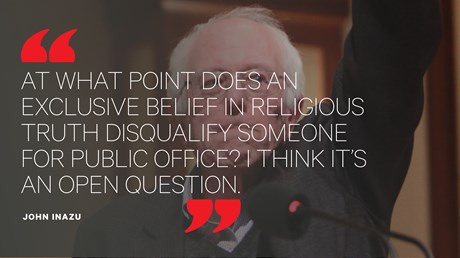The challenges of explaining our theological commitments in an increasingly post-Christian culture.

Christians were left scratching their heads about Bernie Sanders’s grasp of their theology at a political hearing last week. Last year, Wheaton alumnus Russell Vought, President Donald Trump’s pick for deputy director of the Office of Management and Budget, had written about his own faith last year after a professor at his alma mater was suspended for beliefs about Islam.
Drawing on Vought’s statement, Sanders accused Vought of being Islamophobic and making statements that were “indefensible” and “hateful” and challenged his conviction that salvation was secured through Christ alone.
“I don’t know how many Muslims there are in America. I really don’t know, probably a couple million. Are you suggesting that all of those people stand condemned? What about Jews? Do they stand condemned too?” said Sanders, a secular Jew.
While some suggested that Sanders’s statements were essentially a religious test, John Inazu, the author of Confident Pluralism: Surviving and Thriving Through Deep Difference, wasn’t so sure.
“On the charitable reading of this, it’s important to ask nominees questions about whether they are going to treat people of different religions fairly or not,” said Inazu, a professor at Washington University School of Law.
Sanders’s comments raise questions about what Christians expect non-Christians to know about the fundamentals of their faith and how they should express the nuances of their theology to an increasingly pluralistic and non-religious country.
“It was a reminder that baseline level of knowledge is not that deep when it comes to more elite members of the Democratic Party and also other members of society,” …
Source: Christianity Today Most Read